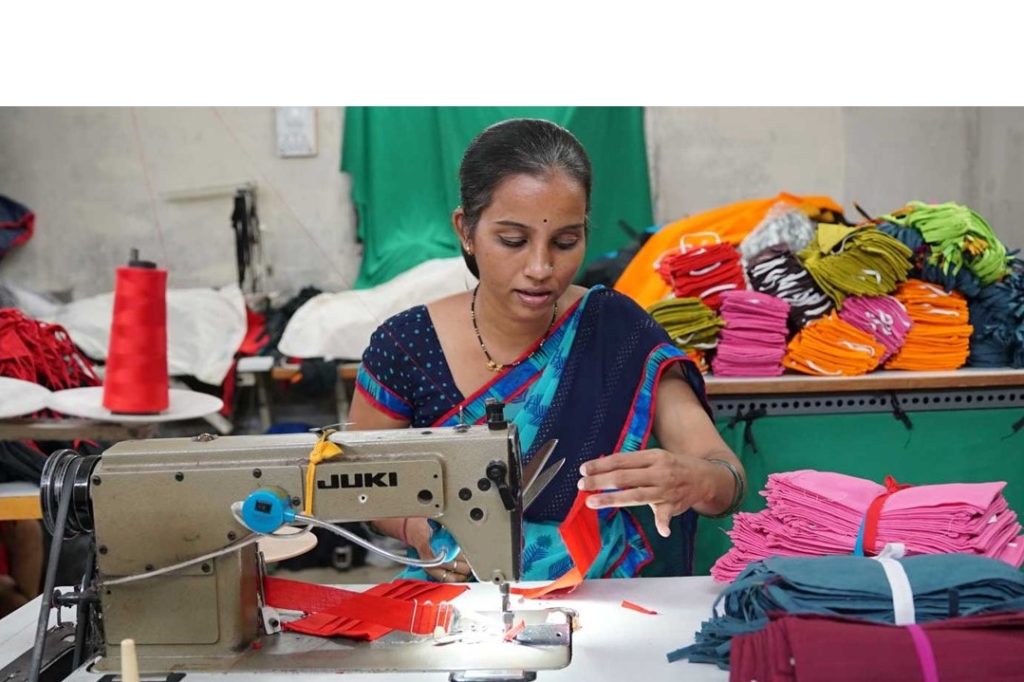A large part of the Indian fashion industry comprises artisans and craft communities rich with heritage, culture, unique skills, and community learning. Their true value and potential have often been unrecognized by markets, leaving them in vulnerable situations. As COVID-19 pandemic hit, artisans became even more vulnerable as they lie at the bottom of the fashion supply chain.
Vulnerable artisans
Artisans bear the brunt of order cancellations and business disruptions due to the economic downturn. The near future looks dismal as the demand for handcrafted products will be limited. Artisans are suffering, not only from the short-term lack of ration and money, but also from the lack of job security and long-term opportunities within their villages. With the option of migrating to cities for jobs also dwindling, artisans are caught in a vicious cycle of poverty due to COVID-19.
What can organizations do?
In May 2020, SAS, a community to move the needle on sustainable fashion in India, spoke to four organizations across India who work with artisans at the grassroots level. One being Women on Wings’ partner Sadhna – a Women’s Handicraft Enterprise. The outcome of the conversations: there seem to be two mayor short term concerns and two mayor long term concerns.
Short term concern #1: Paying wages
With orders being cancelled or postponed, the first step for many organizations is to evaluate if they can continue paying wages to the artisans they work with. Seema Shah, CEO at Sadhna, a women’s handicraft enterprise shared: “At Sadhna, we have been struggling to pay our 700+ women artisans from tribal, rural, and urban slums of southern Rajasthan who are employed on a per-piece rate. That is when their Zila Parishad asked us to make masks and protection suits. With 50 artisans, we produced 1 Lakh (100,000) reusable cotton masks and 8,000 personal protection equipment (PPE) kits. While this has helped us tide over short-term cash flow issues, our future is still uncertain.”
Short term concern #2: Empowering and caring beyond wages
It is important to build trust with artisans. This trust is what can sustain relations during a pandemic. Seema Shah mentions: “Despite the challenging situation we are trying to keep the artisans’ spirits up. We are regularly counselling and interacting with them through digital platforms. Recently we organized our annual governing body meeting over Zoom, a first time video calling experience for many artisans. Around 93 artisans participated in this Zoom meeting which had our Board Mem-bers and the Chief Guest Ms. Kamala Bhasin who gave a great motivational talks to the artisans. Besides this we also conducted our Management Committee meetings during Lockdown on Whatsapp call with the artisan’s Group Leaders.”
Preparing for long term
COVID-19 has disproportionately affected the artisanal community in India. Organizations have stepped up to address short term concerns as mentioned above. Many of Women on Wings’ textiles & handicrafts partners have been able to shift their businesses to PPE making, generating some income for the artisans. But it is crucial to also reflect on the long term concerns around building resilience beyond wages and shifting consumer mindsets. Women on Wings continues working with its partners online to support the organizations in preparing for a world post COVID-19.
Long term concern #1: Self-sufficiency
No organization, no government, no person was prepared for the magnitude of this global pandemic. COVID-19 highlighted fault lines at a systemic level by showing the lack of preparedness. Industries, countries and also India’s textiles industry are working out plans to become more self-sufficient. Women Weave, an organization from Madhya Pradesh that works with rural artisans, is now focusing on expanding its artisans’ skill set. They are also working on developing other products and less intricate crafts which can be sold at commercial price points along with their luxury products. Though most of their processes happen in-house, they are also trying to bring dyeing of fabrics in-house to become more self-sufficient.
Long term concern #2: Consumer mindset
The global consumer mindset is shifting. Consumers are more and more realizing their role in the chain and they are becoming impact investors through consumption. Textiles & Handicrafts’ organizations need to focus on the right terminology when marketing artisanal products. In India ‘handmade’ minimizes the value of craft as it is seen that anyone can make things by hand, but ‘handcrafted’ has intangible values attached to it like a community learning, heritage, history, and culture. Luckily, also India witnesses a raising consumer awareness on the importance of buying craft products now more than ever and what it means when artisanal production stops.
Picture courtesy: Roopali Pavnikar/Mann Deshi


